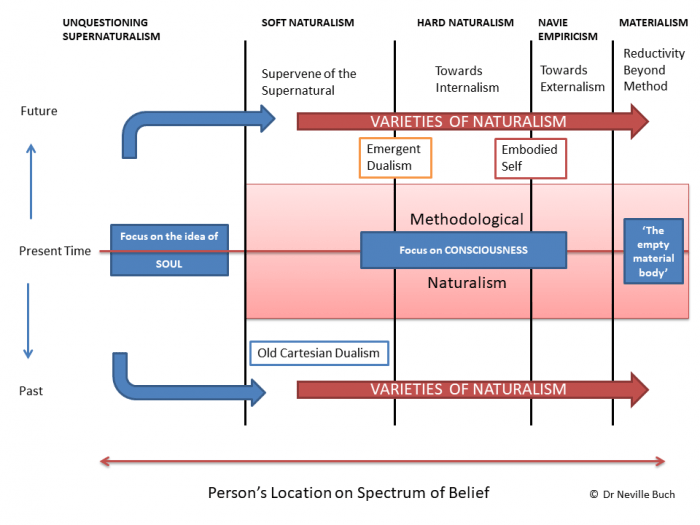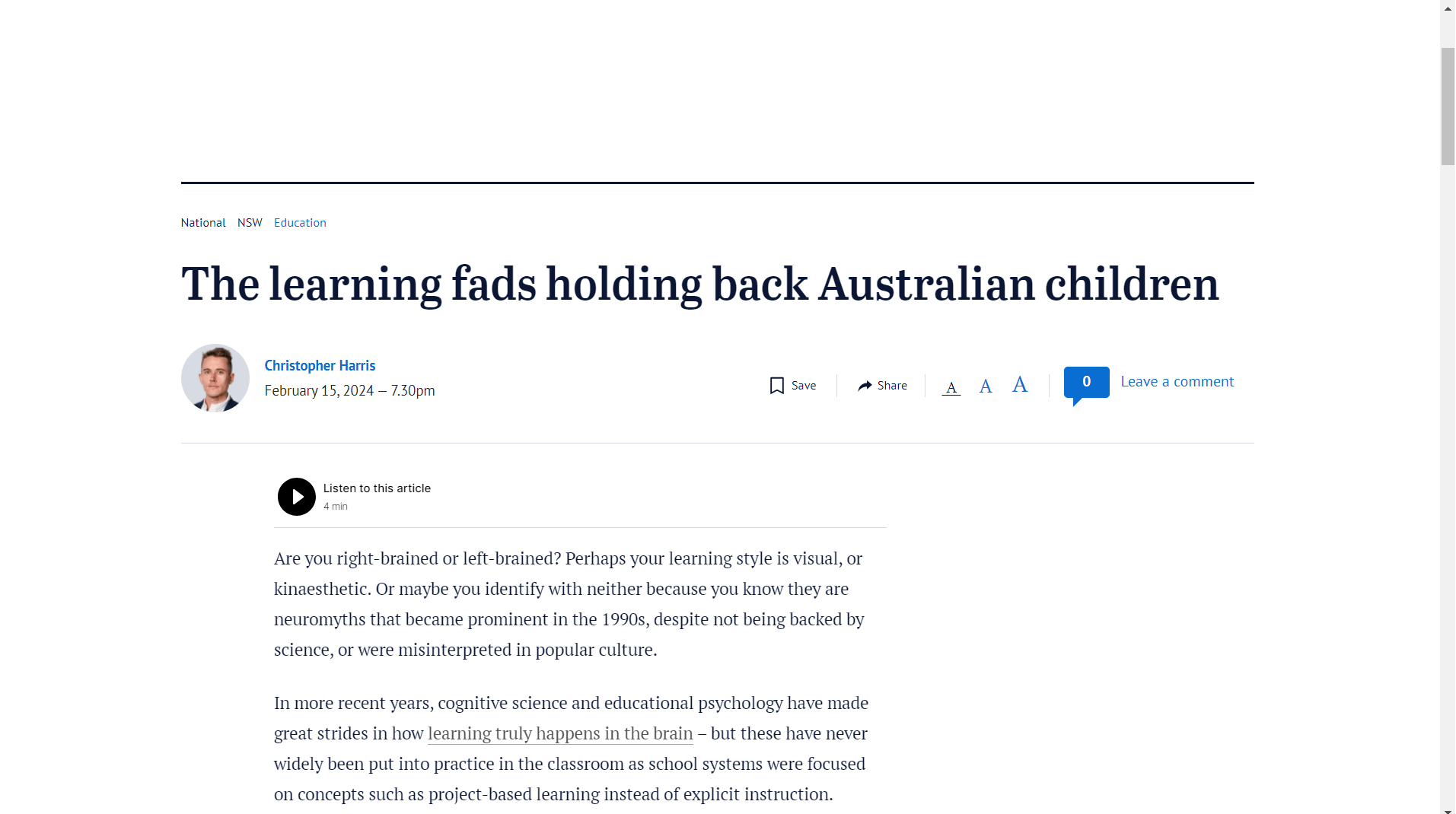For scholars in any field there are moments when reading what a journalist has written, your heart sinks. Why the propaganda wars? Why the culture-history wars?
Christopher Harris’ piece in The Sydney Morning Herald (February 15, 2024, online) is such an occasion. The truth is that there are “learning fads”, out in public culture, and Harris is only promoting yet another “learning fad”, based on Professor John Sweller’s descriptive intellectual history, pretending to be reform in educational theory and design, Why Inquiry-based Approaches Harm Students’ Learning from the Centre for Independent Studies (CIS) Education Program (Analysis Paper 24).
My objections are threefold. John Sweller’s report merely describes the intellectual history and the only explanation is the concept of “explicit instruction” linked tenuously to cognitive load theory. Secondly, what is on offer is not genuine reform but, as I have explained in my extensive work, it is the Spiral history theory of Stupidity. And lastly, the ideological nature of the journalism and the CIS report.
The explanation takes us to deeper areas of education which the public is generally uncomfortable to go into, in understanding. Why bother? Is the reply. So, let first consider a criticism at the journalistic surface level. The appearance: “…project-based learning instead of explicit instruction.” A binary straight up, and a false binary at that. Why? At an appearance level, the answer should be straightforward. Why would “project-based learning” be in competition with “explicit instruction”? There is a deeper answer but that goes to the ideological problem in the argument (explained in point No. 3).
Point No.1. The Concept of “explicit instruction” linked tenuously to cognitive load theory.
The link between Sweller’s ‘explicit instruction thinking’ and cognitive load theory was told a few years ago (Peter Adams, The truth about inquiry-based learning, The Sydney Morning Herald, October 24, 2021 — 1.35pm, online). What was weird about that story was that the critical thinking movement was also a target along with ‘discovery learning’, and ‘problem-based learning’. Again, appearance thinking would indicate something is not quite right in Sweller’s criticism.
Australia’s rankings on international tests such as the Program for International Student Assessment (PISA) have been falling for many years in most curriculum areas. Those falls have been concurrent with an increased emphasis on inquiry learning, discovery learning, problem-based learning (the terms are indistinguishable) and critical thinking in Australian curricula.
Linking the statistics to claims of a causal factor is a “mug’s game”. Then Sweller legitimatises his own interpretation of “explicit instruction”:
Why should explicit instruction such as the use of worked examples be superior to inquiry-based learning? An answer to this question is provided by the manner in which we process and store novel information, an issue covered by the third and fourth principles of human cognitive architecture. Whether novel information is generated during problem solving or whether it is obtained from other people, it must be processed by working memory. That structure, which is the subject of the third principle, is critical to human cognition and critical to instructional design. It also should be critical in decisions to use inquiry learning but is almost never mentioned in curriculum documents that advocate the use of inquiry learning-based instruction.
WHAT! “It also should be critical in decisions to use inquiry learning but is almost never mentioned in curriculum documents that advocate the use of inquiry learning-based instruction.” Sweller is back-peddling into the scope of inquiry learning-based critical thinking! It is disingenuous. Where Sweller is genuine is his work on cognitive load theory. As the ‘science of education’ in theories of cognition there are no problems of understanding. Of course, teachers need to heed ‘extraneous cognitive load’ but is this Sweller’s argument for scientific reductionism? That is, is Sweller suggesting that we should ignore inquiry learning-based critical thinking for the neuroscience? That is what Harris’ journalism strongly suggests. In which case how could neuroscience become education, as primary education, as secondary education, and as tertiary education outside a neuroscience program? The answer is that Sweller’s approach cannot work as education.
Point No. 2. Genuine reform or the Spiral history theory of Stupidity?
Sweller’s report is based on a more substantive paper, What is the Science of Learning, which is a description of the intellectual history of educationalist theory and design: mainly John Dewey (30 times) and nothing of Ivan Illich, and Henry Giroux. There is only one reference to Paulo Freire:
A key figure here is Paulo Freire, who criticised what he called the ‘banking’ concept of education as ‘an instrument of oppression’. Freire described ‘banking’ as:
“Narration (with the teacher as narrator) leads the students to memorize mechanically the narrated content.”
“Worse yet, it turns them into ‘containers,” into “receptacles” to be “filled” by the teacher. The more completely she fills the receptacles, the better a teacher she is. The more meekly the receptacles permit themselves to be filled, the better students they are. Education thus becomes an act of depositing, in which the students are the depositories and the teacher is the depositor…[endnote 15, Freire, P. (trans. M. B. Ramos, 1970), Pedagogy of the Oppressed, Continuum International Publishing Group, p. 72.]”
Freire accepted what was by his time an old tradition of critiquing memorisation and suppression of a child’s natural instincts (see Boxes 1 and 2) and added a political dimension. His ‘critical pedagogy’ advocated that teacher-driven models of instruction are inherently oppressive because they created a hierarchy in which the teacher ‘knows’ and is therefore valuable, whereas a student lacks knowledge and is thus valued less…
Yet this explanation of the neuroscience does not explain why Freire is wrong. Are teachers, all humble “holders of knowledge”, in the semantics which Freire is using, so wrongly placed, as is the tradition?, Surely, the Freirean tradition is correct, that the teacher-expert needs to apply humility and understanding student-learning skills, that is, what is going on in the mind of the student. Any other semantics is merely to launch culture-history warfare. So-called Conservative social critics end up looking like idiots, as they end up saying the very opposite of conservatism in their culture-history warfare.
In such a case of different semantics which Sweller’s argument appears to present, we have a demonstration of the Spiral history theory of Stupidity:
Putting it all together, the spiral history theory of stupidity is the theory of recurrence relation, applied in the historiography of eternal recurrence, but modified in the concept of spiral, universal, histories, and which explains the habit of stupidity. Habit will always take us in the cyclical pattern but habits can be changed by easing out behaviour further away from the centre of habitual despair. Thus, we have hope.
In my work explaining the failure to understand historiography in educationalist theory and design, I make these points:
- The models of historiography are diverse and, although contested, none are “defeated” in the way that Sweller appears to think that neuroscience has sway over proper educationalist theory. “Proper” because such reform was historically defined and successfully defended;
- The best historiography is that which expresses compatibilism and comprehensiveness. A scientific principle, to be sure, but also a principle that Sweller does not appear to understand is of the humanities and social science;
- The very poor thinking on historiography often becomes an exercise in apologetics.
This leads us to the third point.
Point No. 3. The Ideological problem in the argument.
It is not a point which I need to explain at length as my relevant tome of work is published: summary pieces, academia,edu, and dispersed academic papers in lead academic journals (example), as an independent researcher; which Professor Sweller is in his role in the CIS. The difference between Sweller and I is that I am open about ideological schemas at play.
In all honesty, it may not be Sweller’s problem but the problem in the way CIS journalism applies Sweller’s neuroscience work for education. That is for Sweller to answer. Nevertheless, the attempt to replace inquiry-based learning and critical thinking with “cognition load theory” is simply ideological. It suits the grossly-bad formulated historiography of the big business world. It is simply in big business interest to undermine education which is critical and applies an instructional approach where workers are taught to be able to question the mission of any business; it is just that such education is also focused on enquiry and critical thinking. I am not saying that this is Sweller’s personal agenda, but his ignorance of fields, outside of his expertise in neuroscience, is his undoing.
There is a very large and wide historiography picture (as in Wittgenstein) that backgrounds the CIS work. It is explained in my Research Note: Anglo-American Major Belief-Doubt Systems.
Concluding Thought
Having explained why Harris’ journalism and Sweller’s messaging is so wrong, one wonders why the “chooks” are so commonly feed, and why the best intellects in the country are left out in the cold? Out in the cold of community education and isolated from the institutions.
Featured Image: “Persons Belief In Mind Brain” diagram. 1 700×525. Published in Synopsis for Book Project. Horizon Worldviews: The Makings of A Broad Society In Queensland 1911-2001 (a Philosophic History).

Persons Belief In Mind Brain 1 700×525
Neville Buch
Latest posts by Neville Buch (see all)
- J. D. Vance’s Insult to America is to Propagandize American Modernism - July 26, 2024
- Why both the two majority Australian political parties get it wrong, and why Australia is following the United States into ‘Higher Education’ idiocy - July 23, 2024
- Populist Nationalism Will Not Deliver; We have been Here Before, many times… - July 20, 2024

